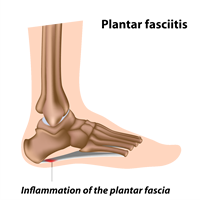The feet support the body and help you move around the world as you please. Injury and illness can leave your feet aching and cramping with every step. If you rely on your ability to stand, walk, and run to keep up with your family, don’t let a problem like plantar fasciitis slow you down. Irritation and other symptoms make it hard to get through a full shift at work if you have to stand for all or part of the time. However, we can help with this debilitating foot problem.
 What is Plantar Fasciitis?
What is Plantar Fasciitis?
The bottom of each foot features a wide and thick band of soft tissue that runs from the back of the heel all the way to the toes. This band connects to the Achilles tendon and is responsible for holding the tension that creates the arch of each foot. Since the band is located along the sole, it is easily damaged by overuse or any activity that causes it to stretch more than usual.
Plantar Fasciitis Symptoms
Most of the identifying symptoms of plantar fasciitis involve the sole of the foot. Some pain occurs in the center of the foot or could even appear in the toes. We rule out other nerve and muscle problems by looking for symptoms like:
- Comes on gradually during each episode
- Occurs in one or both feet
- Sets in after standing from a seated position
- Stabbing sensation in the heel
- Pain that is worse shortly after you wake up
Cause of Plantar Fasciitis
Unlike many other foot and sports injuries, plantar faciistis is still not fully understood. However, there are numerous suspected causes that seem linked to the development of pain. The causes may include:
- Long periods of standing on a hard surface like concrete or stone
- Repetition at work or while you exercise
- The degenerative processes of aging
- One traumatic injury that stretches or tears the band
- Tight tendons and ligaments that strains the planter faciistis
Plantar Fasciitis Risks
There are a few simple lifestyle mistakes that seem to raise the risk of plantar faciistis. By eliminating these issues from your life, you may find that the pain resolves on its own. Consider fixing problems like:
- Worn out shoes that allow your feet to roll to the inside or outside when walking
- Footwear with improper arch support
- Tight calf muscles, which can be relieved with massage
- Excess weight
- Standing for hours without rest or a supportive surface to cushion the feet
Plantar Fasciitis Treatment Options
Many doctors may recommend surgery as soon as foot pain develops, but about 95% of patients recover with conservative treatments in a year or under. Don’t assume that your pain will only resolve itself through risky surgeries. Our patients in New Haven are can enjoy non-invasive options like:
- Stretching instruction to show you ways to relieve tightness in the band
- Chiropractic Adjustments
- Custom inserts for your shoes for better arch support
Let Us Help With Plantar Fasciitis
Foot pain could cripple you, but treating it early will stop the development of the symptoms before they can change your life. Take charge before chronic pain changes into numbness and tingling or even constant burning. Visit Spinal Healthcare & Physical Medicine to treat your plantar fasciitis without developing a pain killer habit or indulging in surgery that could only worsen the damage.


